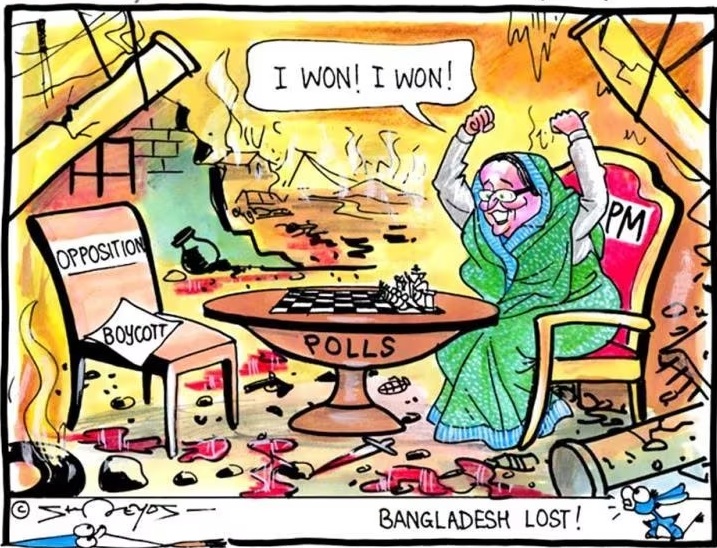Bangladesh Prime Minister Sheikh Hasina quietly sailed on a boat to win another term in power in a contentious national election that was boycotted by the principal opposition and drew a low turnout of voters.
The voter’s regime behavior does not necessarily have to be the onus of the call for the boycott by the opposition Bangladesh Nationalist Party (BNP) and its allies.
The mainstream political party Awami League has failed to muster the confidence of the new generation (Z) to come out and vote. Also, the low turnout was the second time voters, were visibly absent.
Election observers and journalists busy in election reporting contested that the voter turnout would not be more than 28 per cent, which was displayed in the EC dashboard, as Tasneem Khalil of @NetraNews explains that it was based on data sent throughout the day by election officials across the country.
With a magical wand, the election commission at a press conference announced the turnout was 40 per cent and refused to explain the sudden jump in the percentage of voter turnout.
Such an attempt to show-off a comfortable percentage to impress the party members and supporters has sparked a debate.It could not be ascertained why the government wished to show an inflated turnout.
Well, no denying that none of the elections were perfect in Bangladesh since 1973. The election for the 12th parliament has a different twist, but apparently not free, fair or inclusive, of course not a credible too. The elections under the caretaker governments have also been debated for their fairness, manipulation and political bias.
Hours after the official election results were still pouring, Sheikh Hasina’s Awami League another landslide victory have sailed smoothly to power for the fifth term.
Thus Hasina becomes, the longest-serving woman prime minister in the world. Her success will surely make an entry into the Guinness World Records.
Dozens of countries have showered blessings on Hasina for holding a “successful” election which was free, fair and safe
The envoys of Argentina, China, India, Indonesia, Japan, the Republic of Korea, Russia, Thailand to Vietnam, made a courtesy call to the prime minister at her official residence Ganabhaban.
The members of the Organisation of Islamic Countries (OIC) like Algeria, Brunei Darussalam, Egypt, Iran, Iraq, Jordan, Kuwait, Lebanon, Libya, Malaysia, Morocco, Oman, Pakistan, Palestine, Qatar, Saudi Arabia, and the United Arab Emirates visited her at the official residence and presented flower bouquets and exchanged pleasantries.
Hasina expressed hope that the cooperation of friendly countries will continue in the coming days in the development and progress of Bangladesh.
The election has created several records. The highest number of rebel candidates (according to the election commission known as independent candidates) who were aspirants for nomination from the ruling Awami League were denied. They stepped out of the party line and contested and won 62 seats. Except for two, the rest have strong affiliations with the Awami League.
Only three parties won seats in the parliament. Of course Awami League, the Jatiya Party and Kalyan Party, a king’s party formed during the illegal military-backed caretaker government (2007-2008).
Several other King’s parties created by the government flunked. None of the heavyweight leaders could not make it to the corridors of power.
The newly elected lawmakers will take oath on 10 January and Sheikh Hasina will form her cabinet on Thursday.
On the other hand, Jatiya Party declined to take oath on Wednesday. Political observers believe the party, which had been loyal opposition for three consecutive terms during Hasina’s era (2009-2023) will bargain with the government for more ‘halwa-roti’ political concessions from the new government.
Bangladesh has a legacy of dynasty politics. Awami League has Hasina who is the daughter of Bangladesh independence hero Sheikh Mujibur Rahman. Jatiya Party is inherited jointly by the military dictator General HM Ershad’s wife and his brother.
To keep the records straight, Khaleda Zia, chairperson of BNP is the wife of assassinated military dictator General Ziaur Rahman. Presently, their son Tarique Rahman is acting Chairman of BNP, in the absence of her mother who is serving jail terms confined in her home.
Michael Kugelman @MichaelKugelman, South Asia Institute Director at the Wilson Center in Washington DC tweets: [The] US readout on Bangladesh’s election is that the current US policy toward Dhaka will essentially remain in place-a continued strong focus on rights and democracy, but otherwise stay the course and keep pursuing deeper strategic partnership.
Saleem Samad is an award-winning independent journalist based in Bangladesh. A media rights defender with the Reporters Without Borders (@RSF_inter). Recipient of Ashoka Fellowship and Hellman-Hammett Award. He could be reached at saleemsamad@hotmail.com; Twitter (X): @saleemsamad















